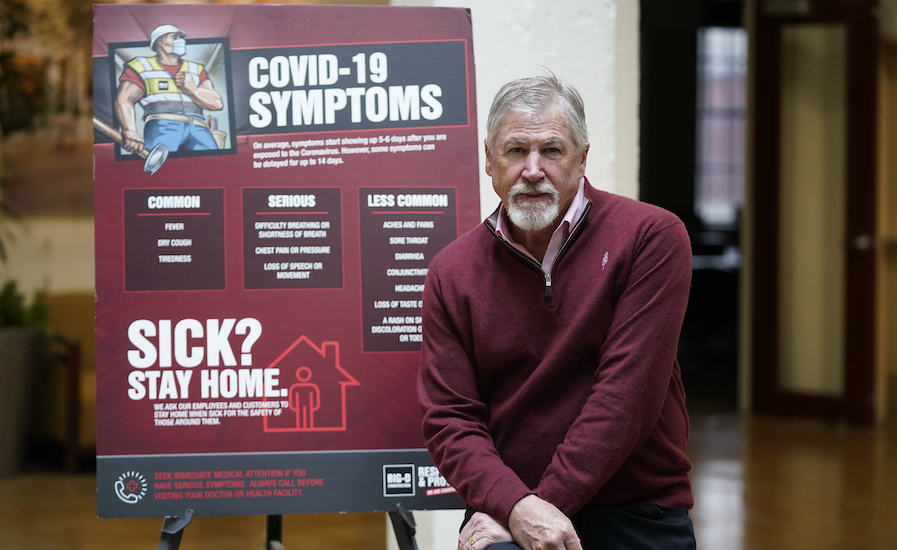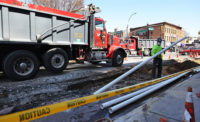Managing in a Pandemic
Viewpoint: Vaccine Mandates Can Cost Money

Rob Moore, CEO of Salt Lake City-based Big-D Construction, said he supports vaccines but has questions about the mandate rollout. He already has a worker shortage on his job sites, and he said employee surveys tell him that nearly 20% of his workers don't want to get inoculated, so they would need to be tested weekly. Photo: AP/Rick Bowmer
Over the past 18 months, construction costs have escalated dramatically, with the pandemic triggering tumult in the labor market, upending the supply chain and sending materials prices to historic highs. Now, while some owners try to keep projects on track and jobsites safe by requiring vaccines for all site staff, they may be inadvertently exacerbating their already worrisome financial risk.
A closer look at the situation reveals how these elements are interrelated and what can be done to offset the negative effects.
The tight labor market shows little sign of loosening up anytime soon. A 2021 survey by the Associated General Contractors of America (AGC) and Autodesk found that nearly nine out of ten contractors are having difficulty finding skilled craftworkers—nearly double the figure from 2020. The Bureau of Labor Statistics takes a longer view, confirming that monthly job openings in construction reached the highest level recorded in more than two decades.
Compounding the worker shortage is the general antipathy toward the vaccine that pervades the field. The most recent data, from Carnegie Mellon University and the Center for Construction Training and Research, shows the extent of the problem. The data shows that construction workers are more than twice as vaccine-hesitant as other occupations, at 38%, and the construction worker vaccination rate, 57%, lags behind the 81.3% rate in other fields.

Barakat
Taken together, these two factors result in some serious unintended consequences for owners that choose to implement a vaccine mandate for all jobsite craftworkers (except those granted a medical or religious accommodation.
We are not talking about a policy that allows regular testing in place of vaccination. Except for accomodations, it’s vaccinations for everyone.
Contractors will undoubtedly incur extra costs, whether to recruit qualified vaccinated labor (and possibly foot the bill for workers’ vaccines), to pay a premium to attract vaccinated labor or to import vaccinated labor to a project site.
The result will be that general contractors will file claims for additional money.
If, as is likely, a smaller, fully-vaccinated work crew is ultimately assembled, the time to do that will lengthen the time needed to complete the project. General contractors can then make delay claims as the job schedule slows, further depleting the project budget.
When a vaccine mandate is an owner-driven policy, rather than a CDC or NIH guideline, it can be viewed as what’s called a “constructive change” to the construction contract.
Under these circumstances, general contractors and their subcontractors are entitled to ask for additional funds and/or delay costs in order to comply with the owner’s changed requirements to the contract. When workers are not given access to federal or state sites due to policies that were driven by President Joe Biden’s executive order, general contractors can also look into the change of law clauses in their contract for relief to costs and delays.

Jozwick
This is unlike a standard force majeure clause event—when unforeseen, extraordinary events prevent a party from fulfilling the agreement, and contractors can be awarded additional time (but no money) to complete the project. An owner’s direction to use a vaccinated workforce can be interpreted as a claim for changes to the contract and interference with a contractor’s means and methods, so a constructive change claim for more money can be justified.
There’s little incentive for the construction industry as a whole to mitigate this situation; it will fall to owners to do so.
It’s critical for owners to understand the potential cost and delay consequences if they embark on a 100% workforce vaccination policy. It may create too many problems to implement.
So owners need to weigh the potential costs associated with a mandated vaccination policy against the approach of protecting the physical health of workers and the fiscal health of the project by requiring weekly COVID testing for unvaccinated people.
If the labor force regularly tests negative, and can keep coming to work, it will ease the pressure on general contractors and trade contractors under a workforce shortage and an under-vaccinated industry population to keep construction moving forward.
John Jozwick, executive vice president and general counsel for property and construction consultant Rider Levett Bucknall’s North America practice, and Sam Barakat, a principal, can be reached at john.jozwick@us.rlb.com and sam.barakat@us.rlb.com or 602-443-4848.



